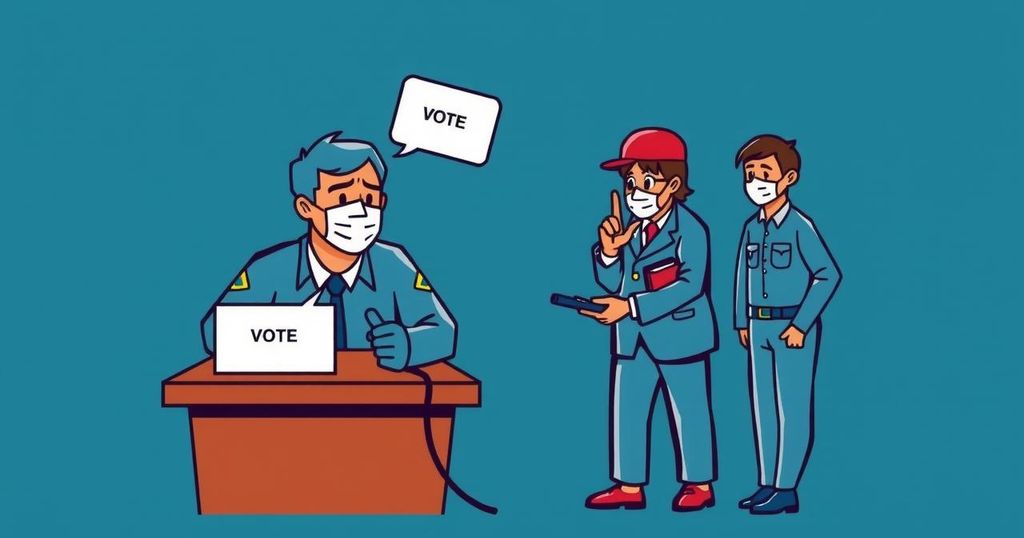The Republican Party is mobilizing over 175,000 poll watchers as a response to widespread distrust in elections, particularly among supporters of Donald Trump. While officials believe their presence may deter fraud, there are concerns about possible intimidation and misinformation. The Democratic Party is countering these efforts, yet fears of vigilantism remain prevalent as the November 5 election approaches.
As the upcoming general election approaches, the Republican Party has mobilized a significant number of poll watchers, claiming their presence will serve as a deterrent against potential fraud. This movement arises from deep-seated distrust in the electoral process among Republican voters, particularly in battleground states, leading to heightened concerns about vigilantism on Election Day, November 5, 2024. Jeff Fuller, a retired Army Special Forces officer and organizer of the GOP poll-watching initiative, articulated that “their presence alone is kind of a deterrent, because everybody knows somebody is watching.” Poll watchers have historically been a part of American elections, representing both major parties to ensure transparency in the voting process. They monitor how ballots are cast and counted, and can report any irregularities to legal representatives. Andrew Garber, an attorney with the Brennan Center for Justice, emphasized the dual role of poll watchers, noting, “Poll watchers can provide transparency. They can raise issues that poll workers might not see as they deal with all sorts of other busy jobs on Election Day,” while also expressing concerns about misinformation and overly aggressive tactics. The Republican National Committee (RNC) has reported upwards of 175,000 volunteers engaged in poll-watching activities, a considerable increase aimed at reinforcing their electoral security measures. This recruitment effort taps into a persistent narrative among conservative voters regarding electoral integrity, particularly following the unsubstantiated claims of widespread fraud during the 2020 presidential election. In contrast, the Democratic Party is organizing its own cadre of legal experts and poll watchers to counteract these efforts, although no specific numbers have been disclosed. Concerns have emerged about the behavior of poll watchers in recent elections, with instances of disruption and intimidation reported in various states. In 2022, aggressive monitoring tactics, including the presence of armed individuals, have led some election officials to worry about escalating tensions this year. Garber remarked on the troubling trend, stating, “Over the past couple of elections we’ve seen a growing trend of poll watchers spreading disinformation.” As recruitment efforts continue among Republicans, conservative constituencies have expressed their determination to ensure electoral legitimacy, despite a poll revealing that 66% of Trump supporters still believe that the 2020 election was not executed fairly. Veteran election officials have voiced their anxieties over the potential for increased confrontations between poll watchers and election staff. Strategies are being developed to mitigate disputes and to ensure safety at polling places. Tina Barton, a former election official who has faced threats due to her role in the electoral process, shared her experiences and the long-lasting impact such intimidation can have on election officials’ lives. An intelligence bulletin from the Department of Homeland Security warns of likely attempts to incite violence through unfounded claims of election fraud in the lead-up to the 2024 elections. Fuller, acknowledging the concerns surrounding vigilantism, stated, “It’s not true. It’s not true.” This situation underscores a critical intersection of beliefs, behaviors, and the existing framework of American electoral integrity, leaving officials and voters alike on edge as the election approaches.
The article discusses the rise of partisan poll watchers, primarily mobilized by the Republican Party, as a reaction to perceived electoral fraud during previous elections, particularly the 2020 presidential election. It highlights the tensions surrounding the presence of these observers at polling places, the historical role of poll watchers, and the concerns among election officials regarding possible intimidation and disruption in the electoral process. With over 175,000 volunteers reported, the GOP’s significant commitment to poll watching is contrasted with the Democrats’ organized legal and observational countermeasures.
The mobilization of an extensive network of Republican poll watchers has raised significant concerns about election integrity and the potential for vigilantism in the upcoming general election. While proponents argue that these watchers serve a crucial oversight function, fears of intimidation and misinformation have prompted serious apprehension among election officials. The ongoing discourse reflects the stark divide in voter confidence and the implications for future electoral processes.
Original Source: abcnews.go.com






